Thinking about launching a paid search campaign to promote your business, products, or services?
Paid search advertising is a cornerstone of digital marketing, with a great reputation for delivering conversions and exceptional ROI when campaigns are effectively optimized. Google claims that for every dollar businesses spend on running ads in the Google Search Network, they receive two dollars in revenue – so what’s preventing more businesses from taking advantage?
From our perspective, a major reason is a lack of familiarity. Organizations need to fully appreciate the benefits of a paid search campaign before they can successfully navigate its complexity.
To help out, we’ve created this short guide that explains everything you need to know about PPC advertising and the benefits of paid search. We’ll give a clear definition of paid search, explain how paid search advertising works, show examples, and highlight the benefits that a paid search campaign can create for your business.
What is a Paid Search Campaign?
Paid search is a type of marketing campaign where digital marketers bid for ad space in search engine results pages for keywords related to their products or services.
As search engine users engage with ads in their search results, digital marketers pay advertising fees to the search engine based on the number of clicks, impressions or responses generated.
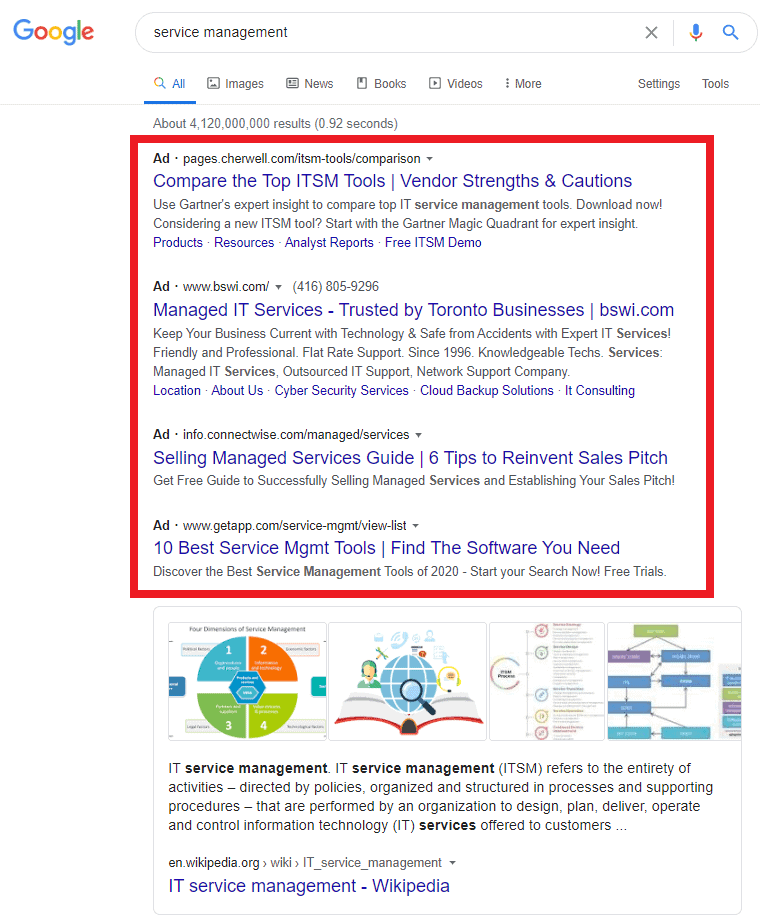
Image: Type just about any search query into your favorite search engine and you’ll see something like this: advertisements from paid search campaigns positioned at the top of the search engine results page – above organic search results and featured snippets.
How Does Paid Search Advertising Work?
Paid search advertising operates as a partnership between digital marketers (who purchase ad interactions) and search engines (who sell ad interactions on the search engine results pages).
Here’s what each of these parties brings to the table:
Search Engines
- Receive billions of page views each month from users searching for information, reviews, and products.
- Collect data on audiences and how they use keywords to search for relevant websites
- Manage a keyword auction where advertisers can bid on keywords
- Provide tools and resources that help marketers maximize campaign ROI
- Publish advertisements on search engine results pages for specific keywords
- Charge advertisers a fee when a user clicks on their advertisement
Digital Marketers/Advertisers
- Register with a search engine advertising network (e.g. Google Search Network, Microsoft Advertising)
- Bid on relevant keywords in the keyword auction, to compete for ad space in search results related to those keywords
- Write search advertisements that are CTR-optimized and support campaign objectives while satisfying the format and content guidelines of search engines
- Create landing pages that are optimized to convert ad respondents into customers, subscribers or leads (depending on campaign objective)
- Pay for advertisements based on the numbers of impressions, clicks, or responses generated.
What is PPC?
Pay-per-click (PPC) is the most common business model used by search engines that offer paid advertising.
Under the PPC advertising model, digital marketers pay for ad space based on the number of clicks that the ad generates. Search engines have the capability to accurately track the number of times your advertisements are clicked on, and to charge your account a small fee for each click based on your set bid amount for that specific keyword.
PPC advertising allows a granular and highly-targeted approach to connecting with audiences. Marketers can customize their keyword bidding strategies to target the most relevant audiences, resulting in higher conversion rates and lower customer acquisition costs.
Where Do Paid Search Ads Appear?
Google Ads, Microsoft Ads and Amazon together control approximately 90% of the total search advertising market in 2020.
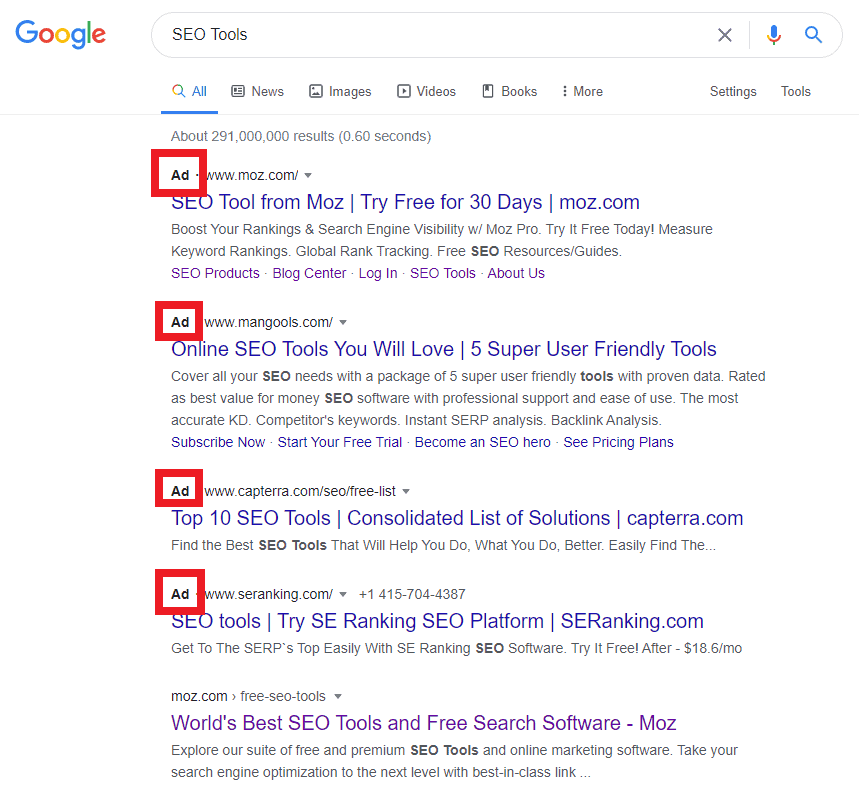
Image: Google search results with paid advertisements highlighted
Google is the biggest player in PPC, controlling approximately 70% of the market. Google shows paid search ads at the top of its results pages.
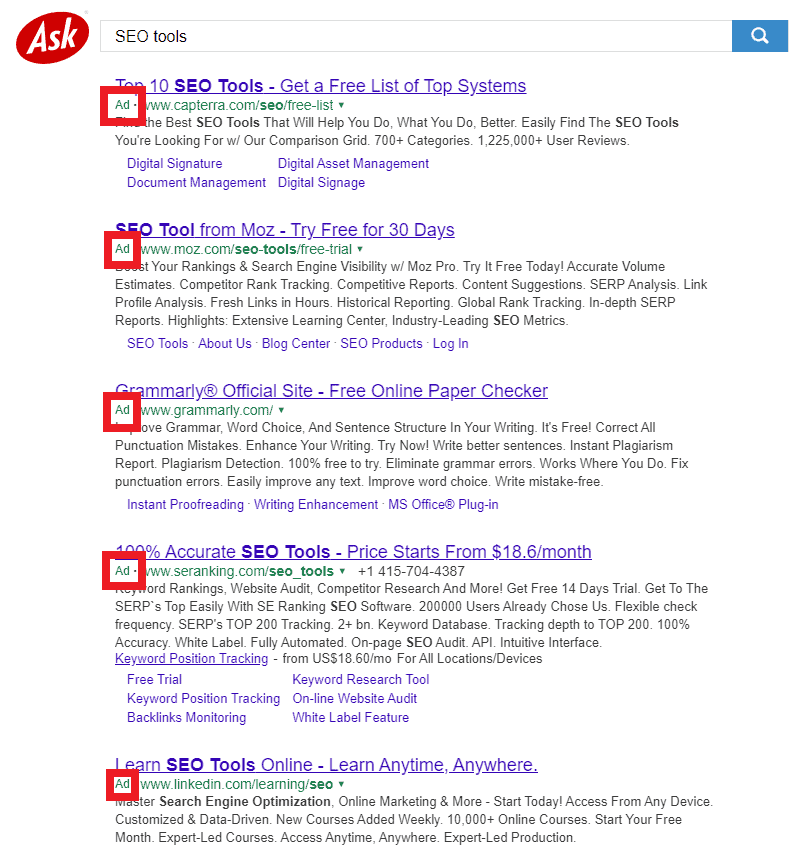
Image: Ask.com search results with paid advertisements highlighted. As part of the Google search partner program, Ask.com features Google search network ads on its results pages.
In addition to showing search ads on its own results pages, Google manages a search partner program with over 500,000 online partners that can also show Google search ads on their internal search results and directory pages.
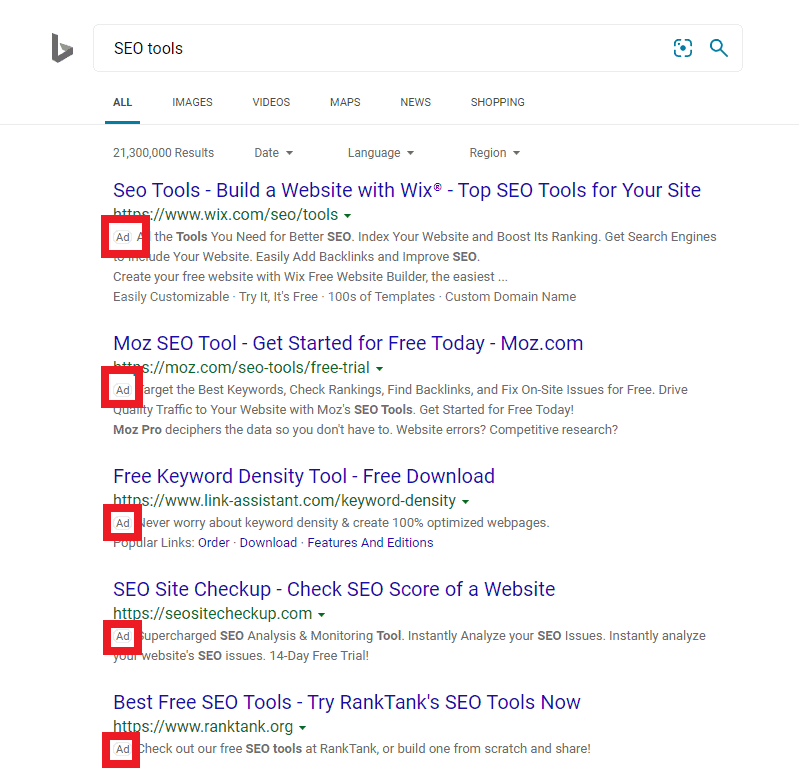
Image: Bing search results with paid advertisements highlighted.
Microsoft operates the Bing search engine and its network of search partners that include WebCrawler, AOL Search and Yahoo! Search.
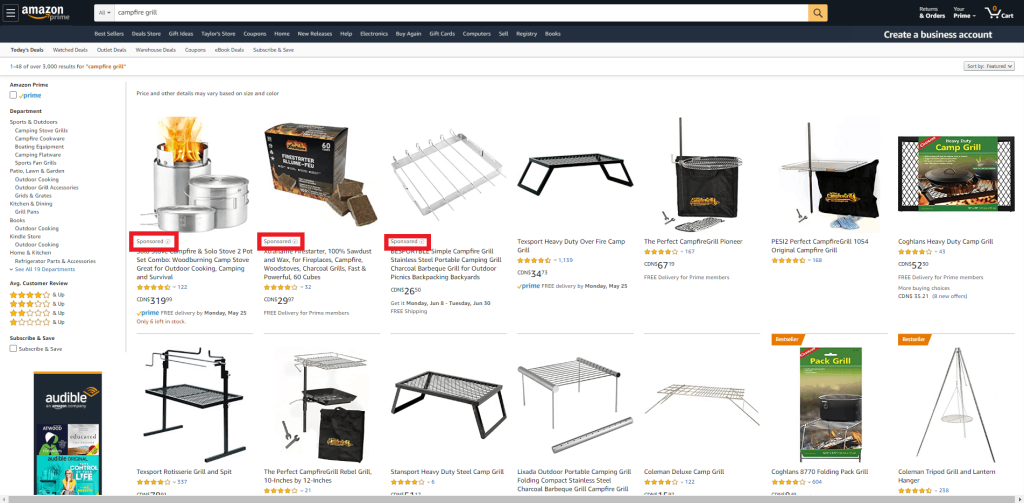
Image: Amazon product search results with sponsored listings highlighted.
Amazon’s online marketplace allows merchants to sponsor their product listings to the top of the search results, making it more likely that users will find and purchase their products.
What are the Benefits of a Paid Search Campaign?
Audience Targeting
The key benefit of paid search advertising is that ads can be highly targeted based on the interests, browser history, demographics and search behavior of the audience. The ability to target an advertisement based on the keywords a prospective customer just typed into their search engine leads to contextually relevant ad experiences that drive conversions.
Cost Control
Search advertising networks like Google Ads make it easy for digital marketers to control and manage the cost of advertising. Marketers can set daily budgets and configure maximum bid amounts for specific keywords. Marketers can optimize their paid search campaigns on an ongoing basis to make sure they’re targeting the most relevant customers with the right messaging to drive conversions.
Data-Driven Advertising
With paid search, marketers can adopt a data-driven approach to optimizing their marketing funnels. Ad networks provide plenty of data on ad performance that marketers can use to find strategies that generate more clicks. When combined with data from Google Analytics, marketers can achieve end-to-end insight into their marketing performance and quickly identify the best opportunities for improvement.
Who Can Benefit from a Paid Search Campaign?
Paid search has proven profitable across thousands of implementations, showing that almost anyone with a great product or service to sell can benefit from paid search. Below are three great use cases we’ve seen for PPC advertising.
Lead Generation
Generate leads for your company by using paid search ads to promote gated content, webinars, white papers, and free trials. Ask the prospect to enter their e-mail before accessing your high-value content.
eCommerce Sales
If you sell products or services online, a paid search campaign can bring high-value customers into your online store for a low cost.
Promoting a Local Business
Search advertising networks make it easy to target audiences from a local area. With Google Search Ads, marketers can:
- Use the Location Ad Extension to include their business address when their ad is presented in the search results
- Target the name of their city or town as a keyword
- Set up a pay-per-call campaign that focuses on generating business inquiries from local customers
Final Word
Thanks for reading our short guide to paid search!
We hope we’ve provided you with a more complete understanding of exactly what a paid search campaign is and how you can benefit.
If you’re ready to get started with PPC, the next step we’d recommend is to create a Google search campaign and start working with limited budgets and test audiences to promote your website, product, or service. Let Directive’s ppc agency experts help you take your campaigns to the next level.
-
CEO Garrett Mehrguth
Did you enjoy this article?
Share it with someone!

